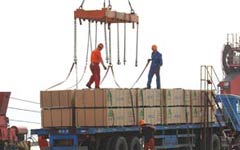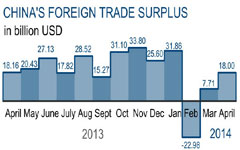Mei Dafu, vice-president of Zhejiang Shipbuilding Co, one of top 10 exporting companies in Ningbo, said his company has buffeted the storms in the shipping industry because of a decision made in 2004.
That year, the company received a big contract for 76 ocean engineering vessels. Back then, most of its production capacity was for cargo and container ships.
"So we invested 2 billion yuan in upgrading our production line. And that was where we began to grow into the industrial leader we are today," he said.
|
 |
 |
Other manufacturers in Ningbo moved their production base overseas.
According to Wang Lei, a board member of safe-maker Safe well Group: "Sales channels are vital for manufacturers. Through purchasing the United States brand, the Ningbo-based company has acquired new technologies and put its products on the shelves of US stores."
Chen Hongyu, an adviser to the Guangdong government, said it is no longer viable for the province to maintain export growth by cutting production costs.
Guangdong's manufacturing sector is falling behind in technology, he said, because of two reasons: inadequate infrastructure investment and ill-suited industrial structure.
Its investment in ports and highways is lagging behind other coastal provinces, he said.
Fixed-asset investment in Guangdong grew by 10.1 percent to 770 billion yuan in the first five-months of the year. But in Jiangsu, the figures were 20.6 percent and 1.2 trillion yuan for the same period.
Chen also said Guangdong-based manufacturers are heavily dependent on light and textile industries, which do not generate much added value.
Zhu has called for more infrastructure investment in the province in sectors like public transport, airports and intercity high-speed railways.
